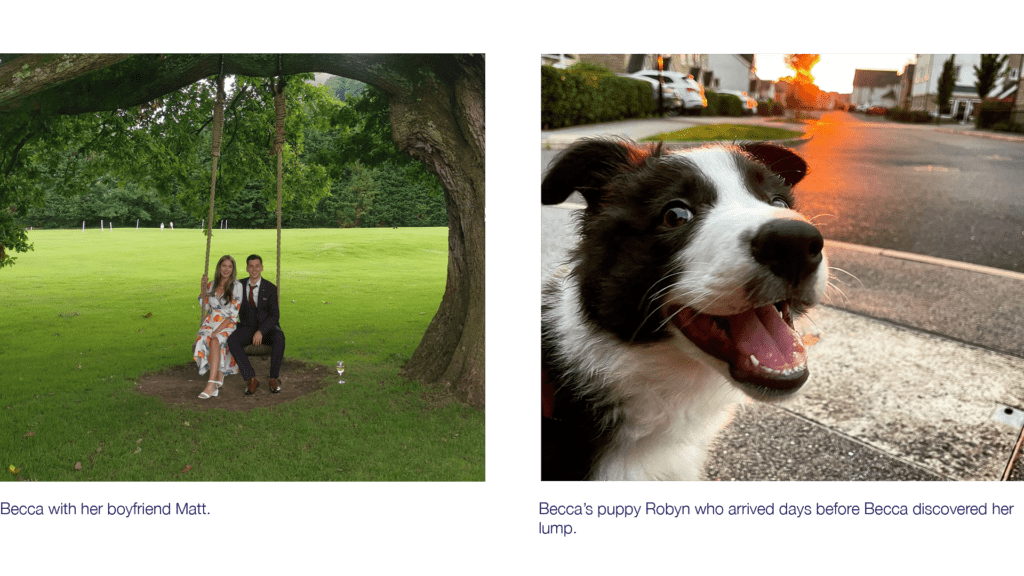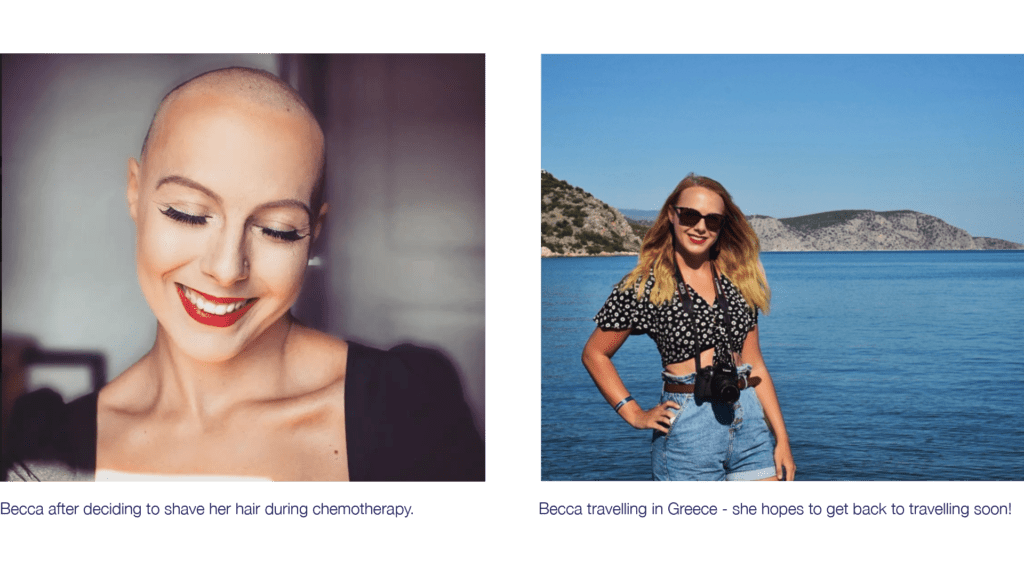
After hearing about the importance of chest checking from Asda’s Tickled Pink campaign, Becca had been checking her chest regularly for two years when she noticed something unusual for her and decided to get checked out by a doctor. Becca spoke to us about being diagnosed with breast cancer at 26, and why she is focusing on the word ‘treatable’.
Over the past two years, I’ve worked at Asda head office. CoppaFeel! is one of Asda’s charity partners as part of their Tickled Pink campaign, so there are regular communications sent out and information readily available on the intranet which have helped to raise my awareness of breast cancer quite substantially. Even in the toilets, posters would be displayed encouraging people to check their chests!
At 26, with no family history of breast cancer, I knew that I was at a low risk of developing it, but even so, I would still regularly sit in the cubicles at work having a feel – just to be sure!
One day, my boyfriend Matt pointed out a change in my left breast when we were lying in bed cuddling. Something didn’t feel quite right, he said. I sat up and had a feel but didn’t notice anything worth worrying about. Matt felt again when I laid back down, guiding my hand to what he described as a ‘hard patch’. He was right, there was definitely something prominent when I was lying down.
Nearly every check I’d ever done myself I’d been standing or sitting – it just hadn’t occurred to me that you could notice a change when lying down. I have been checking my breasts regularly for the past two years, so I knew what they normally felt like and when I noticed a change, I knew it was something that I needed to get looked at.
It was a Friday evening when I discovered the lump, but I called the GP as soon as they opened and was seen the following Tuesday. The GP confirmed that they could also feel something irregular, so they referred me to the specialist breast screening service at the hospital and I got an appointment nine days later. I went on my own to the hospital, opting not to tell any of my family. I was in the mindset that it would just be a cyst or something harmless, so it was pointless to worry them.
That same day in hospital, after an ultrasound, biopsy and mammogram, I was told that I most definitely had cancer. My head was just in autopilot at that point. I nodded along to everything they had to say, taking it all in. I didn’t even get upset, I just accepted the news as if someone was telling me the bus was going to be late – it is what it is. I phoned Matt as I came out of the hospital to tell him the news. I then sent a message to my immediate family and three close friends.

A week after I was diagnosed, I went back to the hospital to find out my biopsy results and they outlined a treatment plan which consisted of chemotherapy to shrink the lump, surgery to remove it, radiotherapy to make sure everything’s gone and finally ten years of hormone therapy to minimise the risk of it returning. I started chemotherapy just five weeks after the official diagnosis. I felt like I didn’t even have enough time to digest the diagnosis before I was catapulted into the whole new world of chemo.
I have six cycles of chemotherapy. I’m almost five cycles in and I’ve had two hospital stays with infections that my immune system can no longer fight. Luckily, the good days outweigh the bad, so I do count my blessings. I have a dedicated phone number that I can call any time I feel unwell or need some advice, as well as an amazing support network of friends and family that check in on me regularly.

Before I was told I had breast cancer, I lived on my own in a flat in Leeds. Once I’d received my diagnosis, both my Mum and Matt offered up their homes for me to stay – they hated the thought of me living alone through treatment. Unfortunately, my Mum was already living with the word cancer in her house, with my step dad also undergoing chemotherapy. I didn’t want to add to her pressures, so I decided the best course of action would be to move in with Matt. Ever since, he has looked after me and taken me to each of my appointments without complaint. I feel like a burden but he is always reassuring and kind. He has been my rock.
With chemotherapy, I have to be careful about seeing people and catching infections, so at the height of my vulnerability I isolate to make sure I don’t catch anything. Fortunately for me, the whole world has just been in lockdown, so I feel like I’m well accustomed to not going out! I still work from home when I feel fit and able and have tried to keep my life as ‘normal’ as possible. I do think this has helped to some extent as it keeps me distracted and gives me something to focus on. I’ve already exhausted most of my Netflix options, so isolating without anything to do would drive me insane!
I feel like I have quite an optimistic approach on life and I’ve been fortunate enough that I don’t think it’s affected my mental health too adversely.
The main word that I have focused on throughout all of this hasn’t been ‘cancer’ – it’s been ‘treatable’. Knowing that it’s something that can be treated and trusting the process has helped me keep a positive outlook.

I think if I were to do anything differently it would be to tell my family and friends about that first hospital visit that I went to alone. I think if they knew I was being tested they may have been able to digest the news a little easier. If I could give anyone the same advice in my position, it’s not to focus too heavily on the negatives. Try to find the positives in your situation and take things a day at a time. For me, it’s my amazing support network, it’s the chemo not knocking me for six, and it’s that beautiful word ‘treatable’.